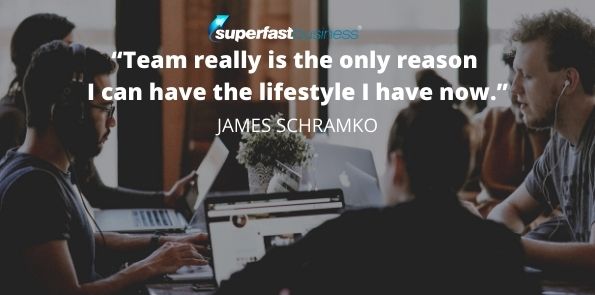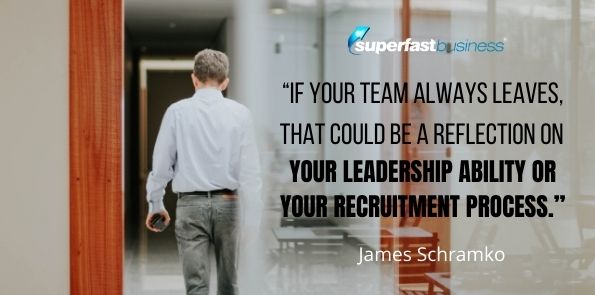The Philippines is a country rich in culture and natural beauty, but it's also the perfect place to find virtual team talent.
James speaks from experience with his own virtual team and what he knows of their country and customs.
If you're looking for someone who can help with marketing, social media management or customer service tasks, then tune in to find out how hiring your virtual assistant from the Philippines can benefit your business.
Podcast: Download (Duration: 27:59 — 26.1MB)
Get Notified Of Future Episodes Apple Podcasts | Spotify | Amazon Music | Android | Blubrry | Gaana | TuneIn | Deezer | Anghami | RSS | More
Podcast highlights:
Build the team your business needs with help from James
Today’s podcast episode is just James, talking about something many people in the online business space struggle with: your virtual team.
James comes from years running a big team for Mercedes-Benz – 70, 75 strong, thereabouts. He came online wanting nothing to do with team or stock or physical premises.
 Today, he still has no stock or physical premises. But he does have a team, and he credits it with the lifestyle he is able to live now. Because James’s job is a bit of content, a bit of coaching, some selling, contacts, network and strategy. The team do everything else.
Today, he still has no stock or physical premises. But he does have a team, and he credits it with the lifestyle he is able to live now. Because James’s job is a bit of content, a bit of coaching, some selling, contacts, network and strategy. The team do everything else.
Are you doing stuff you shouldn’t?
So if you feel like there’s too much on your plate, if your business is somewhat smaller than you’d like, or if you’re working 80-hour weeks, this episode could be useful to you.
It’s sort of sponsored by a business James shares with his wife, VisionFind.com. This is where James recommends you hire people from the Philippines. More on that in a moment.
From just James to an entire village
Going back to James’s online history, he started with just himself, and quickly realized that was ridiculous. He was a general manager by day and a website business owner by night. So he hired someone to help with support.
The support guy handled $500 worth of bonus fulfillments per day. James paid him $500 or $1000 a month, and it worked out well.
Then James recruited someone to write articles. A temporary receptionist at Mercedes-Benz did a standout job, and he paid her $10 an article. She became his full-time contractor, from whom he ordered a hundred articles at a time.
Hiring in the beginning was hard for two reasons: one, James needed an income to hire someone. He didn’t want to dip into credit or take it from his salary. So he needed to sell something.
And two, he had to work out the numbers to show that it made sense, against the urge to do things himself.
For this reason, James wrote Work Less Make More. As soon as people work out their effective hourly rate, hiring just seems like the logical thing to do.
James’s first Philippine hire was referred by a friend of his, when Your Man in India was too booked out to help him. He chose one of two candidates, interviewed over Skype. That was the start. Within two years, he had 65 people in the Philippines.
James’s business scaled over time. He had a web dev business, and an SEO business, both of which he later sold, and most of his team went with them. Some of them now work with a partner of James at SEOLeverage.com.
What he speaks to here is the long-term aspect. He’s now rehired some of his original team, and currently has seven people, who have been with him from eight years to 11 years. So he has a depth of understanding of the Philippines virtual assistant market.
This is how you get the virtual assistant services you need
James created VisionFind to address the need of his clients, who were always asking where they could get someone. James’s wife runs the business with her team, and they’re very good at finding general VAs.
There’s a difference, says James, between already-skilled candidates and those who come in needing training. The former may know WordPress or ActiveCampaign or Ontraport, or Infusionsoft, what have you, but they’re also a risk. They’re market savvy, have worked for other people, may work for multiple employers, and might churn.
James prefers people from outside the online world. They typically come from call centers or are recruited through word of mouth, often family. They may have worked for companies like Dell or AOL, and are used to going into the city to work on a night shift. They’re wanting to work at home, in a stable, safe environment, and are happy to learn new things.
All of James’s team have taught themselves the business’s tools over time. They have general VA capabilities, meaning they have good communication, good English, good hardware, and good internet, all of which are pre-screened.
Over a foundation like that, you can layer on training of the things you want them to do. Many times it’s just showing them what you do, then letting them take over. And if it’s outside your knowhow, it’s perfectly okay. Simply get access to the training and provide them with the resources, whether books, courses, help desk or support tools.
Given, there are other options. Agency-type services, for instance, that let you use their team. That gives you some safety in case someone leaves. You don’t, however, get the intimate intellectual property or build up of a brain for your business that you do with a full-time hire.
There’s also task sourcing, where you get someone to do short tasks. Depending on your luck, it can be a bother finding someone, briefing them, and making sure the job’s done right, then paying them. The good ones can become busy with other clients, and the not-so-good ones, naturally, you just don’t want.
“Task sourcing can really be the death of you.”
James does have specific contractors that he uses for high-level things like Facebook advertising, high-level copywriting, high-level Western design, SEO, and sometimes PHP programming type applications. Using Slack, his contractors work with his team to get things done.
Finding the right candidate-employer fit
VisionFind go through some effort to make sure their placements are a good fit. They consider the country the employer is from, their hours, what business they’re in.
Countries like Australia are advantageous, of course, because of the time zone similarity to the Philippines, but some VAs will agree to work US hours if needed.
 The agency will replace your hire if they leave within the first 30 days, which may happen if you decide you don’t like them, or if they leave you for whatever reason. Note, though, if you’re one of the employers whose team always leaves, that could be a reflection on your leadership ability or your recruitment process.
The agency will replace your hire if they leave within the first 30 days, which may happen if you decide you don’t like them, or if they leave you for whatever reason. Note, though, if you’re one of the employers whose team always leaves, that could be a reflection on your leadership ability or your recruitment process.
If you’re interested in James’s recruitment process, his How to Recruit Your Next Team Member training is inside SuperFastBusiness membership. It’s also available as an individual product at SuperFastResults. It’s the system he pioneered at Mercedes-Benz to hire and train the very best salespeople from scratch, and he used to make a lot of hires.
Creating a safe environment and understanding the culture
James’s team are very loyal, and one of the reasons for that is the safe environment he’s created for them. A safe psychological workplace is important, as guest Nir Eyal talked about in a previous episode.
For context, Philippine hires are likely to be supporting other family members with their earnings – parents, a spouse, siblings. They may be putting nieces or nephews through school. It’s a predominantly Catholic culture, where they look after each other as family units.
Almost everyone there speaks some English, which can be a big surprise. There are more English speakers in the Philippines, says James, than in the UK.
Western culture, that of the US, particularly, is a huge influence in the Philippines. When you go there, you’ll find they watch the same movies, wear the same clothes, even eat a lot of the same food that you do in the West.
The business process outsourcing industry is big in the Philippines. Candidates from call centers are well-trained by their companies – they know about SOPs, have very good customer service training, and some have managerial experience as team leaders.
They’re dedicated and hardworking, used to travelling to work and back in grueling traffic.
“Sales is really just helping people be better off.”
They’re very focused on helping the customer and solving problems, which is great for sales as well as support. Sales, after all, is really just helping people be better off. So James’s team are really good at that.
A lot of the candidates are college graduates, because academic education is highly valued there. James says most of his team are more qualified than he is, and even write better English than he does.
Rates and full-time versus part time
A big question that comes up is pay. James has often started people off at around 25,000 PHP a month, full time.
And he prefers full-time. You can find a lot for someone to do in 40 hours a week. And if you’re both dependent on each other, you can grow a great relationship. There’s no risk that they may be working for someone else in their spare time who may be a better boss than you.

VisionFind can find part-time people, but James recommends full-time, and, if you can afford it, two. If you can spend $1000 or $1500 a month to have almost everything you can think of taken off your plate and never have to do it again, that is a bargain. And with two, the more senior person can train up the new hire, and you’re not left in the lurch in case one leaves.
Over time, you can expect to raise your team’s wages, going into 30s, 40s, 50s, even 60 thousand pesos per month. You’re talking however, about years and high levels of experience.
Should you have them do trials?
Pre-hire trials for your candidate are fine. James, however, suggests you pay for them. You might have them do a short task or let them work with you for a day to see how they fit in.
Some people only use the paid test as a gauge rather than resumes or interviews or references.
What sets VisionFind apart
One thing different about VisionFind is that you won’t find their candidates on the open market. They’re not advertising, looking for an employer in online business. They usually get recruited through VisionFind’s network. Some are found in call centers, where they’re informed of the opportunity. And VisionFind can speak to their effectiveness with lots of successful placements.
“A core of your own team is going to give you a strong base to get out of doing all the stuff.”
Jobs boards and agencies are fine, however do your due diligence. And perhaps you do need a specialist for a one-time project. James does think, though, that a core of your own team will be a strong base to get you out of doing a lot of stuff in your business.
How to keep your team occupied
James’s team do his bookkeeping, podcast edits, bullet points, show notes, transcriptions, the website; they send all the emails, they update SSL certificates and security stuff, they do email redirects, social media… basically everything other than talking on the podcast or coaching a client.
If you don’t think you have enough for your team to do, write down all the projects you’ve been putting off, or that you’re not good at, or that are taking forever to do.
And in some cases, you might come up with an infinity project. This is something your team can work on when high-priority tasks are lacking. James, for instance, has a website in another market that his team post unlimited content to and run the social media for.
 If you feel you’re not a good leader, consider James’s training. The one thing you should bear in mind is, your hires are people. They’re not cogs in a machine. So if you take someone on, you should be responsible to look after them. Take care of them and keep them employed as long as they do their end of the bargain.
If you feel you’re not a good leader, consider James’s training. The one thing you should bear in mind is, your hires are people. They’re not cogs in a machine. So if you take someone on, you should be responsible to look after them. Take care of them and keep them employed as long as they do their end of the bargain.
If you want a virtual assistant from the Philippines, look up the team at VisionFind.com. They’ll find you someone willing and able who can learn the tasks in your business, with time and training.
Access a wealth of business resources and support inside JamesSchramko membership
Let VisionFind match you with the VA you’ve been looking for
Liked the show? Enjoy all the episodes by subscribing on iTunes










Leave a Reply